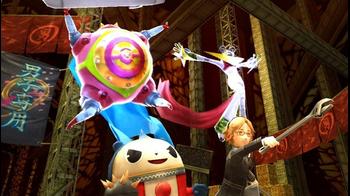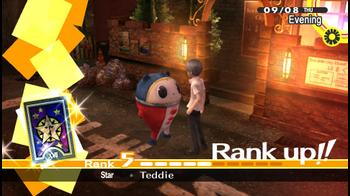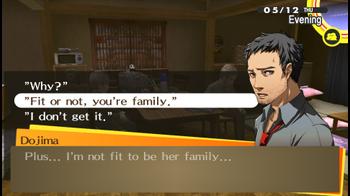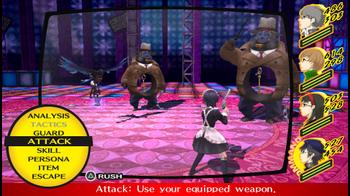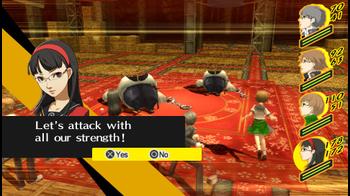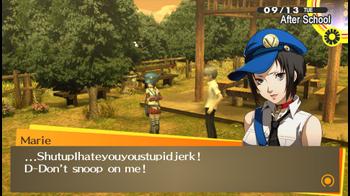
Persona 4 Golden Review
In a time when some might argue against them, Persona 4 Golden stands as a testament to both JRPG lovers and Vita owners that the two ecosystems aren’t quite ready to disappear into the ether.
Although the core experience of P4G isn't all that different from its original PlayStation 2 release, a number of changes and new additions make the trek back into the rural town of Inaba worthwhile for both old and newcomers of the title and franchise. So, should you go headlong into experience this new Persona? The answer is easily, and obviously, a yes.
You, the young and silent high school student, will live in the city of Inaba for a year due to your parents being away for work. From the moment you enter the town you’re greeted by a friendly face, your uncle accompanied by his daughter, who doesn’t really give a friendly face. After arriving at home and a strange visit from a mysterious big-nosed man in the Velvet Room, your new life begins. However, not all is as it seems in Inaba as a series of murders begins to occur soon after your arrival and rumors of weird showings on the Midnight Channel on rainy days. It’s up to you and your fellow classmates to solve these occurings in Inaba when you discover you have the ability to enter a world through the television and summon powerful beings called Personas.
The narrative premise of Persona 4 is extremely simple and the progress you make towards solving the mystery of the murders and the world beyond the television doesn’t get much complex. People mysteriously disappear and it’s up to your merry band of friends to rescue them from the other world. Once you rescue them you wait until they join your crew and wait until it happens all over again. This repetitive narrative cycle becomes almost insulting due to its nonchalant way of trying to add people to your party. At the same time, you realize that you haven’t made much progress in trying to find the culprit behind these preemptive murders. When it finally comes down to the end you realize that there wasn’t much foreshadowing involved for who the culprit was and the payoff for catching the criminal isn’t anything worthing noting.
Still, while the simplicity and the unimportance of the main narrative may be a shortcoming of the series it gives strength to the other aspects of story. The game is primarily concerned with character development and character interactions between the extremely large cast. As the silent protagonist your direct responses to your friends will be minimal but you will see your friends sides of their selves that they hid away and see how they learn to accept their identity and reality as their own. It’s this self-recognition and acceptance of their true selves that truly differentiate Persona 4 from other JRPGs or even its predecessor. For instance, Yukiko struggles with being a successor to the local inn and being tied to the town, however, over the course of the game you’ll find that she slowly comes to terms with how she defines herself and what she should do.
Relationships is a huge theme in Persona 4 and it’s no surprise that with each person you meet, you’ll find something to learn from him or her. The characters that you interact with aren’t realistic but the constant interaction and the large amount of time you spend with each individual makes them unforgettable imitating the relationship forging that occurs in real life. For all intents and purposes, Persona 4 is a social simulation as you make a large amount of friends and knowing who to hang out with and when will help to forge greater and tighter bonds. In this aspect, Persona 4 exceeds in telling the stories of individuals but more importantly your story as you craft your own unique adventure living in Inaba.
All of these character interactions and relationships you have are housed under a system called Social Links. There are numerous Social Links in all and they have ten stages in total. Once you grow closer to someone you’ll level up in the respective Social Links. In order to level up you must spend time with them and make proper responses or actions when around them to maximize your affection. Of course rather than exploiting the relationship to maximize affection in order to level up you’re free to role play and choose responses as you see fit. The system doesn’t penalize you for doing so and as a result Social Links give great freedom in trying to undertake a different persona or manifest your own in the game. Social Links at first may seem like an artificial system included to give meaning to an already meaningful gameplay component but it doesn’t feel tacked on. Rather, Social Links serves to further expand and make Golden an even more impressive game.
Social Links serves as an invaluable asset in battle whether it be forging new powers or receiving aid from allies in the midst of a fight. While the real world serves as a meeting ground for friends the other world serves as a place to fight enemies known as Shadows. In order to combat Shadows, you and your friends must invoke your Personas to combat them, but unlike your friends you have more than one Persona at your disposal. Each Persona is delegated into a certain type of Social Link that is named after a tarot card.
For instance, your relationship with your bud Yosuke is titled The Magician. Depending on what your Social Link level is with Yosuke, when you create Personas of The Magician, it will receive bonus experience making it with a high starting level from the get go. Creating new Personas in the Velvet Room becomes more of a puzzle as you will need to decide if it’s worthwhile to create Personas that won’t benefit from Social Links or not. At the same time, if you wish to create Personas of a certain tarot then it’s best to focus on that respective Social Link. The relationship that Persona creation shares with Social Links is one of the quintessential, and enjoyable, aspect of the game.
Golden uses a turn-based system where you control a party of up to four people. While the turn-based system may seem dated in an age where real-time rules the genre, Golden manages to keep it interesting with unique features and systems. Every party member has access to a Persona with its own strengths and weaknesses, however, you being special can utilize your pool of Personas that you discover and create. Being able to switch between Personas in the middle of battle is essential as some Personas will have movesets that will exploit enemy weaknesses or help to defend against enemies that might exploit your own. It’s an extremely versatile and flexible system that punishes you for playing complacently but rewarding you for using the various Personas at your disposal.
The other three members of the party can be controlled manually or you can let the AI handle it. Whichever way you choose, the rules of the battle will remain the same. Each Persona can learn up to eight moves and you must take out the opposing party. Luckily systems such as One More and All-Out Attacks keep you engaged. When you attack an enemy using its weakness or land a critical hit you get a chance to attack once more. Doing so may knock down the enemy making it vulnerable to any subsequent attacks that may cause dizziness. It’s an easy way to chain multiple weaknesses and knockdown all foes on the field. You may even have an ally pitch in and dish out additional damage or hit other enemies out on the playing field. All-Out Attacks come into play when all foes are knocked down and your entire party will join and bash the enemies for a good amount of damage frequently resulting in their deaths. Utilizing One More and All-Out Attacks help to move battles along and it’s an excellent supplement to the tried and true turn-based combat system.
Under certain conditions your victory might result in Shuffle Time. It’s a cool little system where you have the option to choose one card out of several. These cards may increase your experience gained from the battle, your money, your health, or even grant you new Personas. There are other cards that decrease the amount of experience or money you get but doing so may benefit you as picking up all the cards during Shuffle Time will result in a Sweep. If you Sweep then Shuffle Time will automatically occur after the next fight and you will be able to choose from three cards rather than one. Chaining up Sweeps may level up your party extremely fast but at the same time might cause you to gain money at a slower rate. Regardless, this feature is a welcome one as it just adds more depth and customization in choosing how you want to pick your rewards, or punishments.
Going back to reality after visiting the other world is something completely different. The stark contrast in the types of gameplay you engage in is startling and may feel incohesive but it works to the game’s advantage. If you feel like hunting Shadows or finishing up some quests in the other world then you should do so. However, if you want to spend more time in the real world making friends, building yourself up to be a paragon of sorts, and undertake part-time jobs to earn money then entering the other world so often may not be best for you. The game is all about choice and choosing how you want to spend your time. However, be mindful that if you don’t have a healthy lifestyle of training in both the real and other world, you might not be so ready when fate needs you to be.
Golden adds a good chunk of new content that are extremely enjoyable and also serves to flesh out the Persona 4 narrative and its mythos. Two new Social Links are available and maxing them out along with the existing ones will be tough but it gives veterans something satisfying to look forward to. There is also a new dungeon, and while it isn’t challenging or anything substantial, it offers more plot for those wanting more story.
All of Golden is complemented by its excellent pop soundtrack. The vocal tunes are extremely catchy and fun to listen to. At the same time, the game’s somber and ambient tunes exemplify some of the more darker toned events. If anything can be said bad about the exemplary soundtrack is its repetitiveness. The game can easily be a 60+ hour journey and the same songs might pop up again too often for your patience. The voice acting is just as stellar as each actor does a superb job displaying emotion.
Most of the voice acting is heavily attributed due to Golden’s amazing writing. Each line feels like it was crafted with the utmost care. The witty humor found when your friends are interacting with each other are some of the best parts of the story as their banter never fails to cause some sort of laughter. The writing also vividly describes many of the game’s colorful and vibrant events considering the protagonist remains silent. In short, Golden presents that a JRPG doesn’t have to be bogged down by stereotypical and cheesy lines but can break out and do something unique.
While the game doesn’t push the Vita’s hardware to the max in terms of graphics it does capture the vibrant and colorful Golden creates. Even watching the intro video you get a sense of joy just because of all the colors flying everywhere. The animations are solid and the Japanese high school life is depicted well visually. The various atmospheres and tones the game exhumes is reinforced by how the game looks and in this department Golden does well.
Persona 4 Golden is a monumental achievement in both game design and gameplay. How all the mechanics and systems come together and work in tandem to create such a meaningful experience is a feat in and of itself. To make this experience last for dozens of hours without trying your patience is another. The endless achievements and accolades that could be given to Golden shows the genre’s potential to achieve excellence but most importantly: it’s a damn good game and you should get it.
